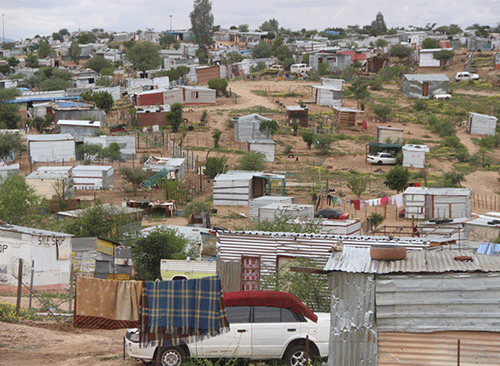To overcome rampant poverty in Namibia, the World Bank in its latest overview advised the implementation of crucial structural policy reforms that it said will be a prerequisite to raise domestic growth potential.
This is after the bank’s overview indicated that some 1.6 million Namibians live in poverty.
According to the World Bank, these structural reforms are essential measures that ultimately change the fabric of an economy, including the institutional and regulatory framework in which businesses and people operate. The structural reforms, said the World Bank, are designed to ensure the Namibian economy is fit and better able to realise its growth potential in a balanced way.
This advice from the international financial institution was offered after an analysis on the effects of Covid-19 on the domestic economy that revealed shocking figures.
The World Bank provides loans and grants to governments of low- and middle-income countries for the purpose of pursuing capital projects and thus reducing global poverty.
“With an increase of 200 000 in 2020, the number of poor people measured by the upper middle-income poverty line (US$5.5/person/day in 2011 Purchasing Power Parity terms) has reached a record-high of 1.6 million.
The pandemic mostly affected already vulnerable people, which threatens to widen social gaps further and increase already extremely high inequality,” reads the report.
Local economist Omu Kakujaha-Matundu commented that Namibia is swimming in a pool of poverty and needs to be saved soon.
He noted the economy is in a serious fiscal situation exacerbated by Covid-19 restrictions and disruptions that requires the government to come up with a clear plan.
“The Namibian government should come up with a serious plan and help the economy go through this storm. We cannot be talking about the second Harambee Prosperity Plan (HPPII) as a recovery plan for the economy that has been suffering for years,” said Kakujaha-Matundu.
On structural reforms, he stated that the World Bank should give clear recommendations that will help the Namibian government: “I am not in full support of structural reforms the World Bank is talking about. This should be very transparent and direct. The reforms they are talking about will be disastrous”.
Due to the negative impact of Covid-19 on livelihoods, the World Bank stated that poverty rates are projected to increase in the near to medium-term, with the upper middle-income poverty rate projected to stay at around 64% until 2022.
The report noted that, typically, female-headed households, the less educated, larger families, children and the elderly, as well as labourers in subsistence farming, are particularly prone to poverty.
Namibia’s steady economic growth in previous years was not enough to deal with the country’s triple challenge of high poverty, inequality, and unemployment. In this regard, the World Bank emphasised that the weakening of growth during the last few years, combined with the Covid-19 shock, significantly slowed down social development progress.
For example, on the back of local and foreign travel restrictions, the local hospitality industry recorded a large contraction of 46.5% year-on-year.
“Overall, GDP is expected to have contracted by 7.3% in 2020. Going forward, the growth outlook is subject to significant uncertainty, given the unknown profile of the pandemic and likelihood of further restrictions in activity if additional infection waves materialise,” outlined the report.
Speaking to New Era yesterday, finance minister Iipumbu Shiimi reaffirmed that economic recovery lies in HPPII.
“We need to redouble our efforts to end extreme poverty in Namibia. With regard to structural changes, the HPPII has outlined areas of structural changes that will bring about new engines of growth. For example, as part of HPPII, GRN is pursuing a diversification strategy in line with 97 products identified as having potential for product diversification. Further, GRN is working aggressively to tap into green hydrogen, which I believe is the energy of the future. This, among others, will change the structure of the economy, create jobs and address inequality,” said Shiimi.
He added that it is important to point out that despite the challenges caused by the colonial legacy, poverty in Namibia has declined rapidly since Independence from about 69% in 1993 to 17% in 2017. This, he noted, has also been highlighted by the World Bank report and added, “As Namibians, it is a record to be proud of. This is not to say that we should now relax.”
Shiimi continued that measures that are in place to control the pandemic as outlined by government are also part of plans to promote economic recovery and try to save the economy.
When contacted for comment yesterday, the poverty eradication ministry said it is still analysing the World Bank report and will pronounce themselves later this week.
In efforts to fight the negative effects of a persistent recession as well as the pandemic, President Hage Geingob last year announced an 11-member Business Rescue Task Force. Towards the end of last year, the task force submitted an interim report that detailed several recommendations. Its proposals included urgent intervention for financing businesses in distress as well as possible tax relief and speedier Value Added Tax (VAT) refunds. The task force also urged government to explore the establishment of a Business Rescue Fund.
Other considerations brought forward were for the finance ministry and Namibia Revenue Agency (NamRA) to consider business tax relief measures and speedier refunds to ensure businesses stand a chance to survive the negative impacts of the pandemic.
Other proposals to alleviate poverty included the Social Security Commission to relaunch its stimulus package for employers and employees, for local authorities and the Electricity Control Board (ECB) to address bylaws, red tape administration burdens and the overall cost of utilities, particularly for SMEs.


